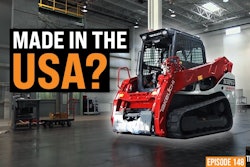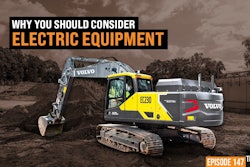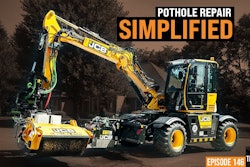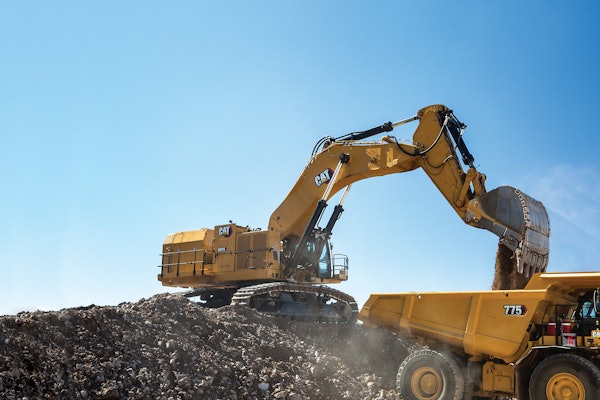“We do feel like things will get better in 2024; however, for the off-highway market, it’s still operating with caution,” says Walt Collier, Americas commercial sector manager, Chevron.
On this episode of The Dirt, Collier outlines the challenges and opportunities the construction industry may face in the year ahead. He points to continued supply chain obstacles and fluctuating earnings due to those variable costs.
Despite that, investment in infrastructure should remain steady and keep contractors busy. Collier says preventative maintenance and equipment uptime must reign supreme in order for contractors to take advantage of the opportunities that present themselves.
Collier also shares his take on the industry shift toward electrification and how it will be impacted by urbanization and infrastructure development and environmental concerns and regulations.
So check out the latest episode of The Dirt to see what trends lie ahead for 2024.
Equipment World serves up weekly videos on the latest in construction equipment, work trucks and pickup trucks – everything contractors need to get their work done. Subscribe and visit us at equipmentworld.com!
In This Episode:
00:00 - 2023 & 2024: A Look Back and Future Predictions
00:29 - 2024 Supply Chain Predictions
02:55 - 2024 Construction Trends
05:16 - The Next Evolution in the Construction Industry
07:05 - Biggest Challenges and Opportunities in 2024
12:40 - What Is There to Look Forward to in 2024?
14:28 - Chevron Lubricants & Fuels
15:50 - 2024: The Year of Opportunity?
16:54 - Final Thoughts
Bryan Furnace:
This Equipment World Video is brought to you by Chevron Delo, 600 ADF ultra low ash diesel engine oil. It's time to kick some ash.
Today. We're here to talk with Chevron again, but today we're just going to talk about 2023 and 2024. What did we just go through? What did we experience? And what can we look forward to next year? Here to join us today is Walt with Chevron to give us a little recap and a look into the future.
Well, Walt, thank you so much for being on the show today. I appreciate your time.
Walt M. Collier:
Hey, thanks Bryan for having me. Always good to be a part of the show and it's always great to see you.
Bryan Furnace:
Yeah. It's good to see you again. My first question for you is kind of as the frontline guys, one of the things that we're still reeling with, it's not nearly as bad as it was, but there's still the hiccups in supply chain. There's still that crazy volatility that's going on, and one of my questions for you is you have a unique perspective as management you get kind of that 30,000 foot view. How do you foresee 2024 being compared to 2023 when it comes to some of those supply chain issues and how will that impact Chevron's business?
Walt M. Collier:
That's a great question, Bryan. We do feel like things will get better in 2024. However, for the off highway market, it is still operating with caution. Going into 2023 from 2022, more than half of global companies highlighted raw materials cost as their number one supply chain threat. As we move forward, I believe that organizations recognize availability may fluctuate. Therefore, customers still expect continued supply chain obstacles, but we can expect to see increase in construction and infrastructure activities across the world, and this will propel for the demand of construction and mining equipment.
Additionally, look for earnings to fluctuate, especially around fuel. Season off highway equipment will need to continue to have a great preventative maintenance in place. Greater demand for maintenance will increase costs and impact turnaround for time for repairs. So the value of preventative maintenance helps keep reactive maintenance down. At Chevron, we're making some changes with our heavy duty engine oil product portfolio to focus on syn blends and synthetics, and the initiative will start in January. So as customers go through these trials and tribulations of the supply chain constraints, of high fuel costs, of things fluctuating, they still have to maintain the equipment and that cost doesn't go away. So while we don't have anything to do with the rates, the cost of fuel, we can offer solutions to help to keep their equipment functioning and in operation.
Bryan Furnace:
It's good to hear that just as we get farther out from Covid, all of the speed bumps, while there might be a couple still, they're much smaller, they're much more spaced out. So it is nice to hear that things are... We're slowly starting to turn back into that state of normalcy.
So my next question for you is, as Chevron's commercial sector and Delo manager, what do you expect to be some of the biggest trends and points of focus in 2024?
Walt M. Collier:
Yeah, Bryan, that's a great question too. In talking with our customers, there will be trends around technological advances that improve off-road equipment efficiency and productivity driving new and replacement sales in large high income markets such as US and Canada.
I've also heard from customers that we expect to see where OEM's investment in autonomous and robotic technologies will increase. Things such as obstacle detection, self navigation are a few things that come to mind. In hearing about improved economics and ease of use that can both help retain workers and increase productivity per machine, and proactive in reducing carbon footprint, which is the bridge to zero emissions and actively around alternative power sources. These power alternatives include biofuels, electrification, hydrogen, hybrid configurations. I read something recently that said, "Electric off highway equipment market size and share was approximately $2.3 billion in 2022, and it's expected to reach $2.7 billion by the end of this year, 2023, and is expected to reach $6.5 billion by 2032."
These are some big trends. However, there will be continuous focus for off highway in 2024 around extending oil drain intervals and off highway engines and reducing operating costs. And this can be challenges because of the dirt ingress. Customers are looking for efficiency, and efficiency is important more than ever, the cost reduction associated with longer oil and filter change intervals must be balanced against the risks of shortened engine life and the cost associated with less reliability if oil drain intervals are extended too far. There are many hidden costs of an oil and filter chains that have influenced companies to find a more efficient approach to keep oil healthy and reliable. That is why choosing the right oil for the right application is so very important and this is part of the reason that we've made some changes to our Delo heavy-duty engine line product portfolio.
Bryan Furnace:
So it's interesting, you touched on a couple things there, the trend on the off highway segment to kind of move into autonomous machines and the technology component, and then you also talked about the extended drain intervals and everything. I really do feel like the dirt industry is in yet another evolution of itself that I would almost compare to going from cable driven machines to hydraulic machines. We're all of a sudden thrusting the entire industry into the 21st century for the first time with autonomous machines, we've got GPS and full machine control. We've got the machine control that's on the equipment is starting to get far more advanced than we ever thought it would as the frontline guys. And then on top of that, to kind of cross over into that maintenance segment, we are starting to get much more scientific with our oil change intervals and preventative maintenance schedules, and we're starting to use oil analysis and things that we haven't done in the past. So I really do think the industry is kind of marching into the next evolution of itself. It's kind of been interesting to witness over these past few years.
Walt M. Collier:
Yeah, and you're right about that. I mean, when you think about the off highway sector, obviously the move to electrification and the upfront cost associated with it, that's really big for you guys. I mean, companies are looking at ways to reduce carbon footprint. It's a lot easier to look at it from the on highway perspective than it is for off highway because most of the regulations around emission controls fall for on highway. Off highway it doesn't, but still companies are looking to get those tax credits to receive those incentives that are available to invest in these newer pieces of equipment.
Bryan Furnace:
Well, I tell you, you talk about electrification. It leads me right into my next question, which is what do you foresee being some of the biggest challenges for your customers as they move into 2024? And then I'll piggyback that question with also, what do you see as being some of their biggest opportunities in 2024?
But before we get into that, I want to take a second to tell you about the sponsor of this video. Chevron Lubricants, protecting your diesel engine and its exhaust after treatment system has traditionally been seen as an either or proposition when it comes to choosing the engine oil that's going to protect your system. And that's exactly why Chevron spent more than a decade of R&D work developing a no compromise formulation. Now, I don't have to tell you why a clogged DPF is bad news, but here's the real kick in the pants, 90% of that ash clogging up your DPF and then upping your fuel and maintenance costs. It comes from your engine oil. You might be thinking, "Why don't they make an engine oil with less ash in it then?" You'll be happy to learn that Chevron agrees with you. They've developed a new ultra low ash diesel engine oil that is specifically designed to combat DPF ash clogging DELO 600 A DF with omnimax technology cuts sulfate ash by 60%, radically reducing the rate of DPF clogging and extending the DPF service life by two and a half times. Before you had to choose between protecting your engine or your after treatment system. Now you don't. Delo 600 ADF with omnimax technology, it's time to kick some ash.
What do you foresee being some of the biggest challenges for your customers as they move into 2024? And then I'll piggyback that question with also, what do you see as being some of their biggest opportunities in 2024?
Walt M. Collier:
Yeah, so when I think about the biggest challenges for the off highway market in 2024, the move to electrification and the upfront costs associated with it is the big thing, but they're really, in my opinion, three bullet points around that. And those bullet points are one, industry shift toward electrification, two, urbanization and infrastructure development. Three, environmental concerns and regulations.
When I think about industry shift toward electrification, major industries such as construction, mining, agriculture and material handling are increasingly embracing electrification to achieve sustainable and efficient operations. This trend has created a favorable market landscape for electric off highway equipment driving their adoption and diverse applications. These pieces of equipment won't be cheap and this may result in upfront costs. When I think about urbanization and infrastructure development, the ongoing global trend of urbanization coupled with the focus on infrastructure development has stimulated the demand for electric off highway equipment.
These machines are well suited for use in urban construction and development projects due to their quieter operation and reduced emissions meeting the requirement of urban environments. But the issue is lack of infrastructure in charging downtime. Where do you charge these electric pieces of machine?
And then you have the environmental concerns and regulations. The increasing focus on reducing carbon emissions and promoting sustainable practices have driven the demand for electric off-road highway equipment, electric machinery offers lower emission and noise levels aligning with stringent environmental regulations and sustainability goals. The off highway side of the spectrum is not there yet, though, like one highway side.
So even in trying to promote sustainable practices by considering electric off highway equipment, you still run into the issue with the lack of infrastructure and charging downtime. So taking that into consideration, when I think about opportunities, the opportunities really focus on two key bullet points as well. The first one is cost savings and operational efficiency. And then secondly, which is really important, is the positive public perception and corporate social responsibility.
When you think about cost saving and operational efficiency, the goal is to lower operational and maintenance costs resulting in reduced downtime and increasing productivity. We see a trend where in off highway equipment, customers are looking to push out maintenance hours to 1,000 plus hours. Obviously, there's a lot that goes into achieving that, like a great maintenance program, good oil analysis program, and choosing the right oil for the right application. Chevron changes Delo product line with a theme called Break with Convention to where the Delo product line moves from a category of four to a category of two.
And then touching on positive public perception and corporate social responsibility. The growing awareness of environmental issues and corporate social responsibility has led companies to prioritize sustainability practices, embracing alternative power solutions aligned with its green initiatives, improving the company's public intimates and brand reputation, which further accelerates the market growth as more businesses seek eco-friendly alternative.
So there are huge challenges that are going on in the industry, but the opportunity center around what can you work with right now? You have fluctuation, you have rates that are going up and down, but you have to be able to keep that equipment intact and ready to roll for various different projects. And so preventative maintenance is going to be the key in choosing the right oil for the right operation to ensure that, that equipment stays running is very key.
Bryan Furnace:
Absolutely. Couldn't agree more. So I'm going to totally shift focus now, and I just want to talk to you, Walt, the man. What are you looking forward to in 2024?
Walt M. Collier:
That's such a great question, Bryan. I'm looking forward to a lot of things. One, I'm looking forward to the industry picking up and getting back to where we were well before 2019. I do recognize that the first half of the year, we'll probably start out a little bit slow, but as we get into the second half of the year, things will ramp up.
I'm also looking forward to the campaigns that Chevron is doing around, I choose Delo. We are out in the market and we're using a different type of approach now. We want to be a lot more intimate with customers. Our brand has been around for a very long time, and for your audience that doesn't know this, Delo is the acronym for Diesel Engine Lubricating Oil. And with that, we want to pivot and change our approach to be more intimate with the customer.
So instead of saying, "Choose Delo." We're going to be working on campaigns where our customers speak for us by saying, "I choose Delo." We've rebalanced our portfolio. We did that to meet the customer needs to shore up supply. The supply chain crutch was really huge for everybody, but we saw an opportunity to close up gaps that we had in our portfolio. And then when we think about the categories we had, we moved from a category of four, which was conventional synthetic technology, syn blends and synthetics. And now when you look at the Delo heavy duty engine oil line, we move to a category of two, which is only syn blends and synthetics.
So if you're looking for a product that could extend your oil drain intervals 1.5 times or more, we have a product there that's able to do that with our Delo 400 XLESB. If you're looking for a product, a full synthetic product with excellent oil consumption, extended life of oil drain intervals and improved fuel efficiencies, we have our Delo 400 XSP line.
And then if you're looking to extend the life of your DPF, if you're looking for over 4% fuel economy and extending the life of the DPF at least 2.5 times, we have the only ultra low ash oil in the market with Delo 600. So looking at all of the various industries in off highway agriculture, construction, mining, we have lubricants to fit all of those needs. And then we also have a one-stop solution when it comes to alternative fuels as well with our acquirement of Chevron Renewable Energy Group. And then we have our compressed natural gas group where we'll build in compressed natural gas stations across the United States. So I really look forward to the changes that are taking place in the industry, and I look forward to talking to our customers about the various different offerings that Chevron has to offer from lubricants all the way to fuels.
Bryan Furnace:
Boy, it sounds like 2024 is going to be a year of opportunity for a lot of people.
Walt M. Collier:
Yeah, it does. I mean, I think once people get their head wrapped around regulations that are impacting the industry, can get a grip on the economy is going to go, they're better able to plan their business. I mean, people are being really cautious, Bryan, because it costs a lot of money to operate. As you know, you're entrepreneur yourself and it just costs a lot of money, and we have to save money the best way we can. And the best way to do that right now for all of the people in the off highway market is to focus on a really strong preventative maintenance program and doing the right things to keep that equipment on the road.
Bryan Furnace:
Absolutely. Well, one of your biggest bottom line things is maintaining your fleet. You've got to do a great job, or those costs are going to skyrocket.
Walt M. Collier:
Hey, maintaining your fleet, maintaining your equipment, that's what you have to do. For sure.
Bryan Furnace:
Absolutely. Well, Walt, thank you so much for the time. Thank you for coming on the show and chatting with us today.
Well, thank you again for Walt and Chevron taking the time to come on the show and give us a little insight as to what we can all look forward to next year. As always, thanks for watching. We wish you and yours the best of holidays. We'll catch you on the next episode of The Dirt.









